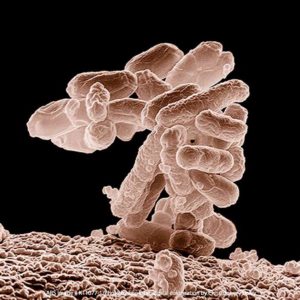File an E. coli O157 lawsuit to help with medical expenses, cost of care and lost income, also pain and suffering compensation. Our lawyers can help you get the money you deserve.
Our lawyers recently won a $7.5 million E. coli O157:H7 lawsuit. Our client was a child who contracted an E. coli infection and then developed hemolytic uremic syndrome, a type of kidney failure. Our E. coli lawyers are now representing people sickened in the E. coli outbreaks linked to ground beef and romaine lettuce. The Cargill ground beef outbreak has sickened 17 people, one of whom died. The romaine lettuce outbreak sickened over 190 people, 5 of whom died.
“People have died after eating ground beef and lettuce tainted with deadly E. coli bacteria. This tragic loss of life could have been prevented.”
Pritzker Hageman E. coli Legal Team
Contact our Law Firm about an E. coli O157 Lawsuit
Our law firm helps families whose loved ones have been sickened by E. coli O157:H7. A lawsuit can help the family with medical expenses, cost of care and lost income. The suit can also recover pain and suffering compensation for the person who was sickened. Many of our clients have been young children.
Among the many strains of E coli bacteria, O157:H7 is the one that is responsible for the majority of E. coli food poisoning outbreaks in the United States.1 What makes this pathogen so dangerous is the Shiga toxin that it produces. The Shiga toxin create ulcers in the colon that can bleed (colitis), producing bloody diarrhea. This stain is called Shiga toxin-producing Escherichia coli (STEC).

When Shiga toxin spreads throughout the body it can cause hemolytic uremic syndrome (HUS) and thrombotic thrombocytopenic purpura (TTP), related diseases that can lead to any of the following:
- Abnormal kidney function
- Kidney failure (renal failure) that may require a kidney transplant (renal transplant) – illness accompanying kidney failure is called uremia (develops when urea and other waste products are retained in the blood)
- Gall stones – probably caused by rapid hemolysis, breaking open of red blood cells and the release of hemoglobin
- Elevated pancreatic enzyme levels that could lead to insulin-dependent diabetes mellitus and/or pancreatitis
- Central Nervous System (CNS) disturbances such as irritability, behavior changes, disorientation, delirium, hallucinations, dizziness, tremors, and several other serious complications listed below
- Seizures
- Coma
- Stroke
- Encephalopathy
- Respiratory disease syndrome
- Convulsions
- Heart problems, including myocardial infarction, cardio myopathy, cardiogenic shock, congestive heart failure
- Cortical blindness, caused by damage to the visual area in the brain’s occipital cortex
- Thrombocytopenia (platelet deficiency in the blood)
- Death
Is My Loved One Part of an E. coli O157:H7 Outbreak?

To determine if you or a loved one is part of an outbreak, the following steps need to be taken:
- A medical professional needs to get a stool sample, preferably within 6 days after onset of diarrhea, but it can be more.2 There have been cases where a rectal swab conducted after E. coli symptoms have ended has tested positive. In cases where a child is suffering from kidney failure (renal failure), a rectal swab should always be done to determine if the bacteria is present. Most cases of kidney failure in children are caused by hemolytic uremic syndrome (HUS) that has developed from an E. coli O157 infection.
- The stool sample should be screened. This is usually done using media containing sorbitol, since this bacteria does not ferment sorbitol rapidly.
- Pulsed-field gel electrophoresis (PFGE) should be conducted to find the DNA “fingerprinting” of the bacterium that made the person sick. Some labs will use whole genome sequencing (WGS) as well. These tests will determine if a patient is part of an outbreak and will help pinpoint the source of the illnesses (food, water, or animals).
These steps need to be taken to protect your legal rights. The companies responsible for making you or your loved one sick need to be held accountable. If your child was sickened by E. coli, you can file a lawsuit on your child’s behalf. Money won in a settlement or verdict will be placed in trust for your child.
Pritzker Hageman law firm helps people hold corporate wrongdoers accountable for selling contaminated food. Our lawyers have appeared on national and local news programs discussing food safety and litigation against food manufacturers, restaurants, and others. In two of our recent cases, the firm represented the families of women who died from TTP-HUS. Our lawyers have won cases against restaurants, grocery stores, food manufacturers, distributors, schools, petting zoos, state fairs, and others. Our cases have involved contaminated ground beef, lettuce, spinach, cheese, pizza, hamburgers, steak, raw milk, and other contaminated foods.
To contact our lawyers, please call toll-free at 1-888-377-8900 or submit the firm’s online consultation form.
References:
1. Frenzen, Paul D., et al. “Economic cost of illness due to Escherichia coli O157 infections in the United States.” Journal of Food Protection® 68.12 (2005): 2623-2630.
2. Gould, L. Hannah, et al. “Recommendations for diagnosis of shiga toxin–producing Escherichia coli infections by clinical laboratories.” MMWR. Recommendations and reports: Morbidity and mortality weekly report. Recommendations and reports/Centers for Disease Control 58.RR-12 (2009): 1-14.